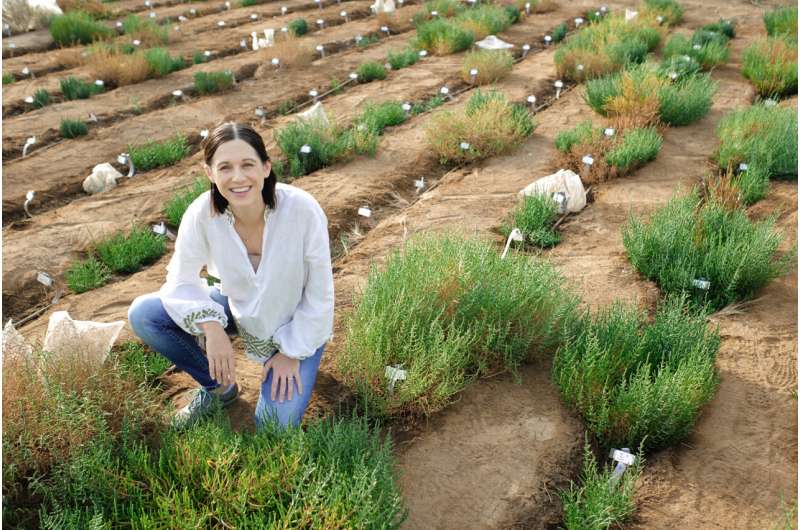This article has been reviewed according to Science X's editorial process and policies. Editors have highlighted the following attributes while ensuring the content's credibility:
fact-checked
peer-reviewed publication
trusted source
proofread
Plant research could pave the way for growing crops with seawater

Budding new plant biology research is paving the potential to produce food crops that not only survive but thrive in salty conditions. With salt estimated to affect up to 30% of arable land worldwide—jeopardizing the survival of crops—the salinity crisis is a costly burden on agricultural productivity.
Led by the University of Newcastle's Dr. Vanessa Melino, the research team has studied plants of the genus Salicornia to better understand its salt-resistant properties.
"Our research reveals how salt-tolerant plants function on a molecular level to cope in extreme environments. We can use this information to breed crops that can be cultivated with saline groundwater or even seawater," plant physiologist and molecular biologist Dr. Melino said.
Uncovering the secrets of salt-loving plants
Dr. Melino has spent years developing pure breeding lines of Salicornia while working at King Abdullah University of Science and Technology (KAUST) in Saudi Arabia—where the plant is native. Salicornia thrives in saline areas across the globe, including central Asia, the Americas, Europe, the Middle East and Northern Africa.
In a study recently published in Nature Communications, Dr. Melino and her team reveal new insights into the molecular mechanisms behind the high salinity tolerance of Salicornia.
"Unlike most other plants, Salicornia can accumulate high concentrations of sodium in photosynthetically active succulent shoots while avoiding ion toxicity.
"This suggests that Salicornia has highly efficient processes to store sodium in compartments within cells through the action of specialized transporters," she said.
Understanding this process provides hope for the development of salt tolerant crops and for the future of seawater-based agriculture.
While most plants die in a salty environment, Salicornia thrives.
"Salicornia actually depends on saltwater to grow and reach maturity," Dr. Melino said.
A vegetable oil alternative?
Described as crispy, juicy and salty, Salicornia is comparable to asparagus which is how it coined its nickname, "sea asparagus." It's already enjoyed as a delicacy in some countries, yet Dr. Melino sees fresh potential to grow the plant to produce both a vegetable oil and a high-protein ingredient.
"By focusing on fats (oil) and protein, we are trying to develop products that can be transported easily and are more sustainable than other sources—using seawater for irrigation instead of relying on limited freshwater resources," Dr. Melino says.
The meal could also be an excellent source of protein for humans, as there is a growing demand for alternative proteins, or else, it can be used in fish feed formulations.
Dr. Melino said it was crucial to consider profitability for farmers or growers.
"The goal of our research is to help farmers cultivate a food crop in their saline soils using seawater, or brackish water, where they have no other options due to increasing salinization.
"No other existing crop can grow in these extreme conditions."
Taming a wild species
Salicornia is a wild plant though, Dr. Melino explained. "You can't take a wild plant, cultivate it, and expect to get a good yield and production from that plant.
"Traditional breeding to domesticate wild plants is slow, tedious and costly," Dr. Melino said.
Dr. Melino and her team are turning to modern breeding tools to speed up the domestication process. "With modern genomic and genetic tools, we can select and introduce traits that are desirable for cropping."
While researching in the Middle East at KAUST, Dr. Melino and her team were the first to apply genetics and genomics to domesticate Salicornia.
"Our goal is to turn this wild plant into a profitable oilseed crop for farmers. We are using tools and techniques to do that as quickly as possible," Dr. Melino said.
Australia's sea asparagus—the cousin of Salicornia
Now based in Australia and lecturer at the University of Newcastle, Dr. Melino is turning her attention to native salt-tolerant plants like Samphire—also known as "sea asparagus."
Dr. Melino said the use of Samphire as an edible plant was not new.
"There is some evidence that Indigenous people in Western Australia discovered the seeds of this plant were edible long ago. I would like to now connect with Elders locally who may be able to share Indigenous knowledge about their traditional uses of Samphire," Dr. Melino said.
"Samphire is a relative of Salicornia. It grows in wetland areas of Australia, and in inland salt lakes. It thrives in areas that are very salt-affected. Few plants are able to cope in these environments because of extreme levels of salinity."
Giving new life to salt-affected land
With more than 2 million hectares of Australian farmland affected by salt, Dr. Melino sees an opportunity to explore domestication of Samphire into a high-value oilseed and alternative protein source.
Dr. Melino hopes to partner with Australian growers and producers, particularly in Western and Southern Australia where the scale of the salinity issue is more severe.
"If we can produce oilseed crops using saltwater, farmers can reserve their limited freshwater supply for use on other types of food crops," Dr. Melino said. "Fresh water scarcity is a major limitation for agriculture in Australia."
Dr. Melino hopes to give farmers in both Australia and in the Middle East and North Africa, options to grow novel crops without using freshwater resources.
More information: Octavio R. Salazar et al, SOS1 tonoplast neo-localization and the RGG protein SALTY are important in the extreme salinity tolerance of Salicornia bigelovii, Nature Communications (2024). DOI: 10.1038/s41467-024-48595-5
Journal information: Nature Communications , Nature
Provided by Newcastle University



















